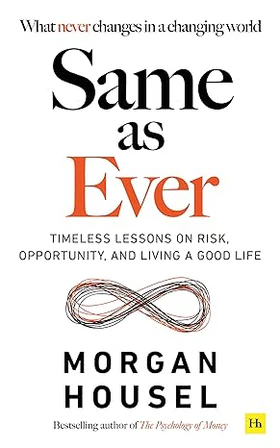
Predict how people behave rather specific events
To base predictions on how people behave rather than on specific events. Predicting what the world will look like fifty years from now is impossible. But predicting that people will still respond to greed, fear, opportunity, exploitation, risk, uncertainty, tribal affiliations and social persuasion in the same way.
Risk is what you don’t see
Invest in preparedness, not in prediction. Expectations and forecasts are two different things, and in a world where risk is what you don’t see, the former is more valuable than the latter. Realise that if you’re only preparing the risks you can envision, you’ll be unprepared for the risks you can’t see every single time.
Manage expectation and reality
The first rule of a happy life is low expectations. People weren’t just better off, they felt better off.
Realising the power of enough
The markets don’t stay within the limits of sanity, and it always overdosed on pessimism and optimism. As result, the only way to know we’ve exhausted all potential opportunity from markets is to push them not only past the point where numbers stop making sense, but beyond stories people believe about those numbers.
Haste makes waste
Good idea sped up too fast too quickly becomes a terrible idea. Patience to let something grow, and scarcity to admire what it grows into.
When the magic happens
The circumstances that tend to produce the biggest innovations are those that cause people to be worried, scared, and eager to move quickly because their future depends on it. Stress focuses your attention in ways good times can’t. It kills procrastination and indecision, taking what you need to get done and shoving it so close to your face that you have no choice but to pursue it, right now and to the best of your ability.
Rational optimist
Those who acknowledge that history is a constant chain of problems and disappointments and setbacks, but who remain optimistic because they know setbacks don’t prevent eventual progress. The balance is planning like a pessimist and dreaming like an optimist.
A little inefficiency is wonderful
Not all jobs require creativity or critical thinking. But those that do function better with time devoted to wandering and being curious, in ways that are removed from scheduled work but actually help tackle your biggest work problems.
A unique skill
A skill of identifying optimal amount of hassle and nonsense you should put up with to get ahead while getting long. The world is full of bullshits: personal incentives, emotions, inefficiencies, miscommunication and so on. If your tolerance is zero, you can’t function in the world. The most successful people recognise when a certain amount of acceptance beats purity.
Keep running
No competitive advantage is so powerful that it can let you rest on your laurels, and in fact the ones that appear to do so tend to seed their own demise. The idea that advantage has a shelf life is a fundamental part of growth. Size is associated with success, success is associated with hubris, and hubris is the beginning of the end of success.
People follow incentives, not advice
If you would persuade, appeal to interest and not to reason. Incentives fuel stories that justify people’s actions and belief, offering comfort even when they’re doing things they know are wrong and believe things they know aren’t true. When good and honest people can be incentivised into crazy behaviour, it’s easy to underestimate the odds of the world going off the rails.
Wounds heal, scars last
Most debates are not actual disagreements; they’re people with different experiences talking over each other. People tend to have short memories. Most of the time they can forget about bad experiences and fail to heed lessons previously learned. But hard-core stress leaves a scar. A question to ask: “What have you experienced that I haven’t that makes you believe what you do? And would I think about the world like you do if I experienced what you have?”
A list of questions to ask yourself:
- Who has the right answers but I ignore because they’re not articulate?
- Which of my current views would I disagree with if I were born in a different country or generation?
- What do I desperately want to be true so much that I think it’s true when it’s clearly not?
- What is a problem that I think applies only to other countries/industries/careers that will eventually hit me?
- What do I think is true but actually just good marketing?
- What haven’t I experienced firsthand that leaves me naive about how something works?
- What looks unsustainable but is actually a new trend we haven’t accepted yet?
- Who do I think is smart but is actually full or it?
- Am I prepared to handle risks I can’t even envision?
- Which of my current views would change if my incentives were different?
- If your answer is “none”, you are likely not only persuaded but blinded by your incentives.
- What are we ignoring today that will seem shockingly obvious in the future?
- What events very nearly happened that would have fundamentally changed the world I know if they had occurred?
- How much things outside my control contributed to things I take credit for?
- How do I know if I’m being patient (a skill) or stubborn (a flaw) ?
- Who do I look up to that is secretly miserable?
- What hassle am I trying to eliminate that’s actually an unavoidable cost of success?
- What crazy genius that I aspire to emulate is actually just crazy?
- What strong belief do I hold that’s most likely to change?
- What’s always been true?
- What’s same as ever?